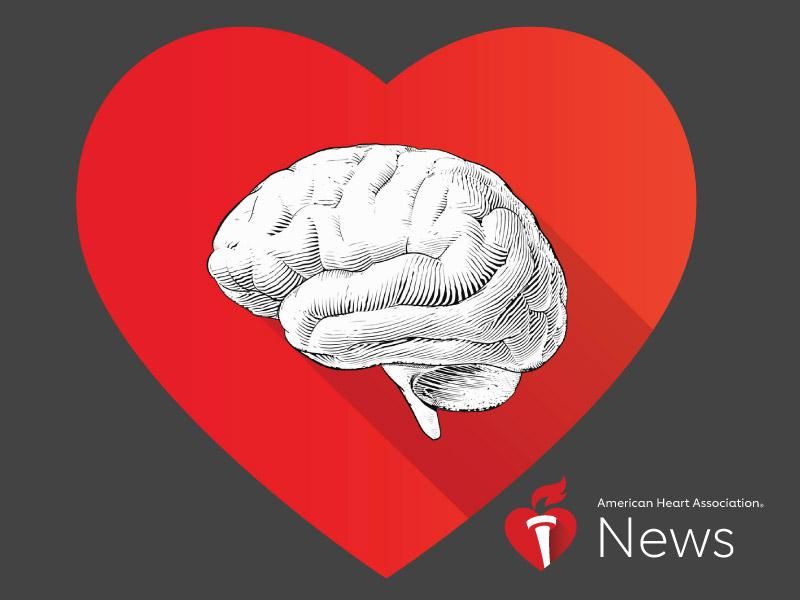
WEDNESDAY, Jan. 26, 2022 (American Heart Association News) — Brain diseases, including Alzheimer’s disease and other forms of dementia, are closely connected to heart health. They are affected by everyday actions and rank among the nation’s leading causes of death.
That’s the portrait of brain health that emerges from the American Heart Association’s “Heart Disease and Stroke Statistics – 2022 Update” published Wednesday in the journal Circulation. It’s the first time the annual report has dedicated a chapter to brain health.
“What we’re trying to do is summarize not only, ‘How common is this, and is it getting more common?’ but also, ‘Why does it happen? And how is it related to other aspects of our health?'” said epidemiologist Evan Thacker, an associate professor of public health at Brigham Young University in Provo, Utah. He co-authored the new brain health chapter.
Cognitive decline and dementia are strongly related to the health of blood vessels in the brain and the brain’s blood supply, Thacker said, which makes the topic important and relevant for the annual statistics report, a widely used resource on cardiovascular disease.
“We are really specifically focused on cognitive health as one of the major functions of our brain ‒ thinking and memory, decision-making, problem-solving ‒ all the things that your brain does that are related to thinking,” he said.
Data from the Centers for Disease Control and Prevention shows that in 2020, the most recent year for which CDC statistics are available, stroke was the leading cause of death from neurological causes and the No. 5 cause of death overall. Alzheimer’s disease was No. 7.
But the CDC data separates Alzheimer’s from other dementias; combined, the deaths would outrank stroke, Thacker said. Indeed, a JAMA Neurology study cited in the statistics report found that Alzheimer’s and other dementias together resulted in about 258,600 deaths in 2017. That compares with 172,000 estimated deaths from stroke that same year.
Other brain health highlights include:
- About 2.9 million people in the U.S. had Alzheimer’s disease or a related form of dementia in 2017.
- About 1 in 10 people ages 65 and older in the U.S. have dementia. It’s more common in women than men.
- Spending on dementias was among the top 10 health care costs in the U.S. in 2016, when it topped $79 billion. That was more than double the amount from 10 years earlier.
- As the population ages, the number of people affected by Alzheimer’s disease and related dementias in the U.S. is projected to increase to 9.3 million by 2060.
Brain health has been addressed in previous statistical updates, but in conjunction with stroke, said Dr. Connie Tsao, chair of the AHA statistics committee that wrote the latest report. Each year, the authors work with the National Institutes of Health and others to compile the most up-to-date data related to heart disease, stroke and cardiovascular risk factors.
The new chapter is a reflection of the increasing awareness among medical researchers on the connections between heart health and brain function, said Tsao, a cardiologist at Beth Israel Deaconess Medical Center and assistant professor of medicine at Harvard Medical School in Boston.
People often overlook those connections even as they care deeply about the effects. Patients, when discussing how they hope to age, often tell doctors that brain health is of the highest importance to them, Tsao said. “They nearly always say, ‘Preservation of my cognitive functioning and ability to interact and connect with people, including my friends and family, are what give me the most meaning to my life.'”
But most people don’t link problems such as smoking, high blood pressure or diabetes to brain health, Tsao said. The update spells out why they should.
It says there is “consistent and substantial evidence” for the role of high blood pressure in cognitive decline and dementia, starting in early adulthood. And diabetes is associated with an increased risk of dementia in women and men alike.
In one analysis included in the report, obesity at midlife was associated with a 33% higher risk of developing dementia compared to people with a normal body mass index.
An individual can work to preserve their brain health, Tsao said, through things such as being physically active, eating a healthy diet, not smoking, and controlling blood pressure and diabetes.
Some factors, however, can be out of an individual’s control, such as genetics and the effects of societal issues, known as the social determinants of health.
“We know that early-life influences matter a lot for cognitive health in late life” when dementia tends to occur, Thacker said. “Social conditions – education, occupation and where a person lives – set the stage for future brain health long before problems become visible.”
More work, he said, needs to be done to look at brain health and racial disparities. For example, the report cites a 2017 review of 114 studies showing the prevalence of dementia can vary substantially, from as low as 7.2% to as high as 20.9% in older Black adults.
Overall, he said, researchers have made great strides in recent years to better understand how common dementia is and why it happens.
“You don’t get sick just because you get old,” Thacker said. “And so that’s why we have this chapter to focus on the relationships” between brain health and cardiovascular diseases.
American Heart Association News covers heart and brain health. Not all views expressed in this story reflect the official position of the American Heart Association. Copyright is owned or held by the American Heart Association, Inc., and all rights are reserved. If you have questions or comments about this story, please email editor@heart.org.
By Michael Merschel

Leave a Reply